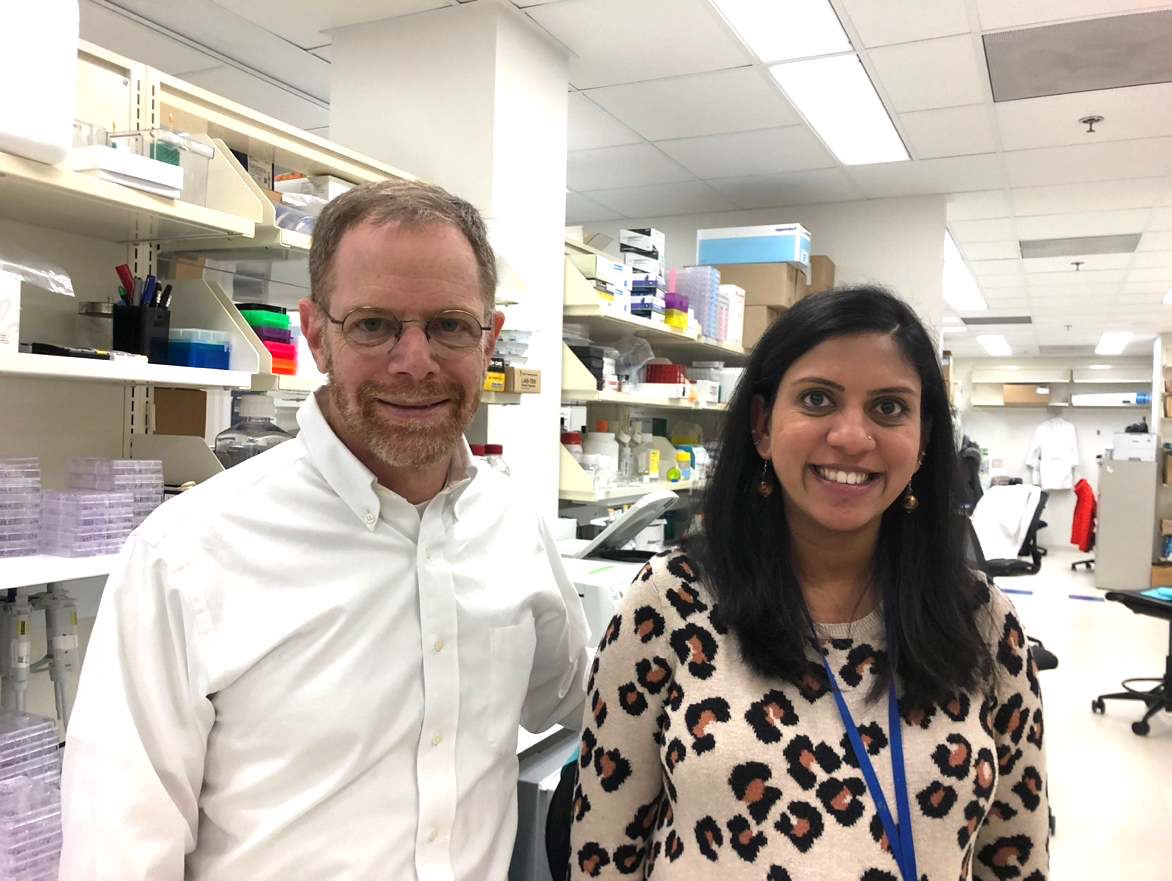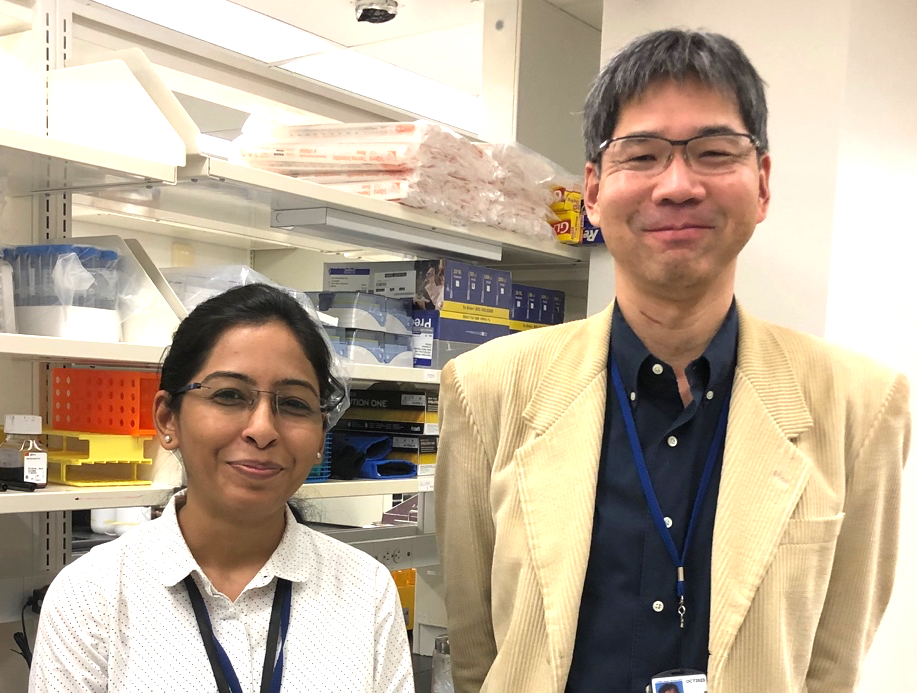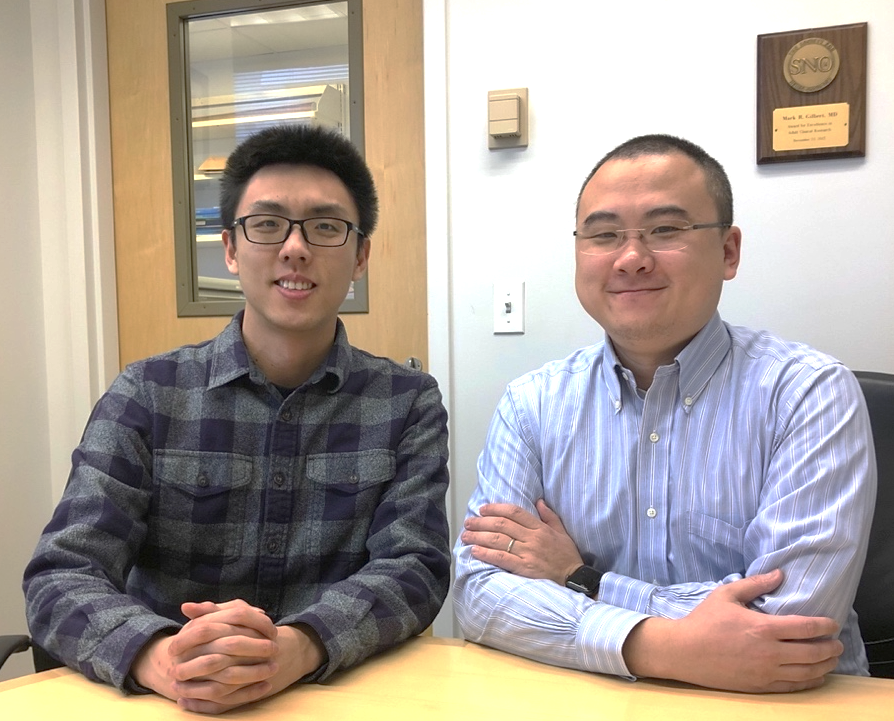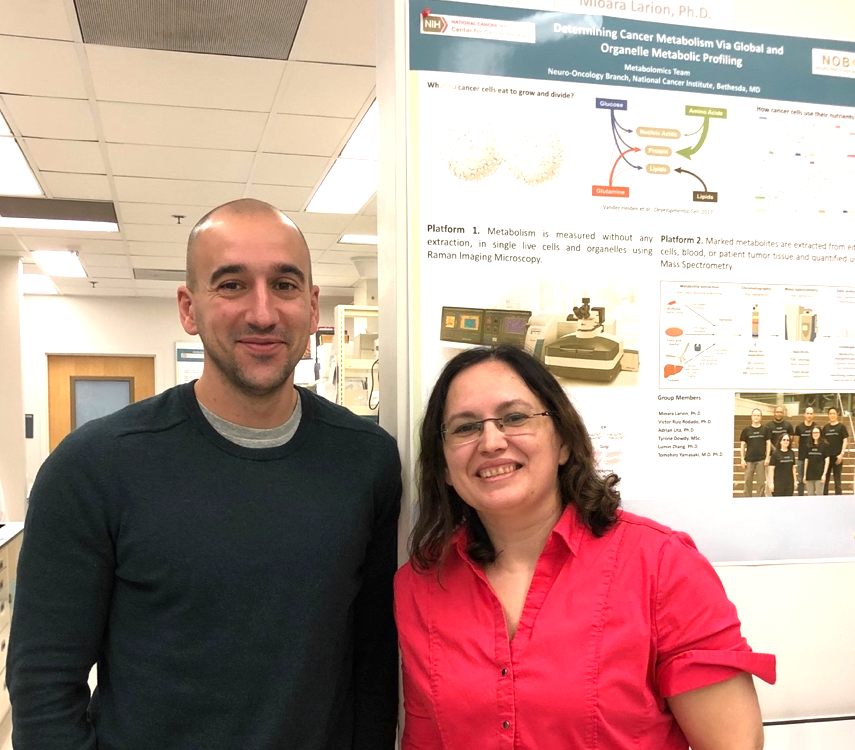Neuro-Oncology Branch postdoctoral fellows share their love for science and how their mentors have made their experience at NIH more rewarding.
By Neuro-Oncology Branch Staff
January 1, 2020
January 2020 marks National Mentoring Month, which was launched, in part, by the Harvard School of Public Health in 2002. A supportive and encouraging mentor can play a powerful role, regardless of one’s age, professional experience, and career field. In fact, a national report called The Mentoring Effect talks about the impact of mentoring early in life. Youths who had a mentor were much more likely to finish school than those who did not.
Here at the NCI Center for Cancer Research's Neuro-Oncology Branch (NOB), we believe good mentorship is key to advancing science and improving patients' lives. To celebrate National Mentoring Month, we spoke with some of our notable mentor-mentee pairs conducting brain tumor research.
Drs. Mark Gilbert and Nivi Ratnam
Nivi Ratnam, Ph.D., joined NOB Chief Mark Gilbert, M.D., in 2018. She wanted to combine her basic immunology expertise with Dr. Gilbert’s tumor immunology and precision medicine approaches to improve responses in brain tumor patients.
“The experience has changed the way I approach scientific questions,” she says. “Dr. Gilbert has given me the opportunity to work on projects that impact what we do in humans.” She says the most rewarding part of her time here has been the opportunities to use clinical observations to design and write clinical trial protocols and interpret human clinical data.
Dr. Gilbert considers Dr. Ratnam an exceptional scientific colleague. “She has a strong sense of responsibility and personal integrity—and has a magnanimous approach to work,” he says. He believes she has been a big part of making other trainees’ experiences positive. “She is always willing to share knowledge and take the time to help others,” he says. Moreover, he emphasizes her ability to build relationships with other labs and institutions, allowing his team to build successful collaborations that benefit the field.
Dr. Ratnam is also grateful that Dr. Gilbert provides her autonomy to create her own project visions, but always remains available to help. “Along with the inspiration he provides to do impactful work, Dr. Gilbert also respects having a work-life balance and has a great sense of humor, making him an ideal mentor,” Dr. Ratnam says.
Drs. Masaki Terabe and Vibhuti Joshi
Masaki Terabe, Ph.D., and Vibhuti Joshi, Ph.D., are new to the NOB. Dr. Terabe is an investigator leading the Basic Immunology Research Program and Dr. Joshi is his postdoctoral fellow. Together, they are building a laboratory to study the role of immunology in brain tumors.
“I came into neuro-oncology without a lot of expertise in immunology and only some background in brain-related diseases. Dr. Terabe has been a mentor, lab colleague, and teacher,” Dr. Joshi says. “He’s made me feel very comfortable asking about anything—science-related or otherwise—and made my transition to my new role in this new country much easier.”
Dr. Terabe also applauded Dr. Joshi’s willingness to learn about an entirely new field. “She is very collaborative, efficient, and organized, which are crucial qualities to help start a new lab. Dr. Joshi has been proactively reaching out to key people inside and outside our Branch who can help us, and absorbing as much of the field as she can,” he says.
Dr. Joshi expressed immense gratitude for the opportunity to work under Dr. Terabe and commended his patience. She has been able to pitch new project ideas and participate in conferences, tumor boards, and several other professional collaborative opportunities at NIH. She hopes to set up her own lab in the future.
Drs. Chunzhang Yang and Yang Liu
Chunzhang Yang, Ph.D., and Yang Liu, Ph.D., both received their undergraduate and doctoral degrees from Peking University, albeit five years apart and from different departments. Dr. Liu was introduced to Dr. Yang through a friend, and they have been working together for a little over three years.
At the time they met, Dr. Yang, an NOB investigator, was recruiting researchers to his new lab. Dr. Liu joined shortly after and has provided not only his scientific expertise to projects, but also helped set up the lab and train several incoming researchers. “I am very fortunate to have a postdoctoral researcher who was already a seasoned oncology researcher. He’s efficient and produces high-quality work at a productive pace,” Dr. Yang says.
Dr. Liu expresses similar gratitude towards his mentor. “We were on the same page about expectations from day one and really developed a close personal and professional relationship,” Dr. Liu says. The pair runs experiments together, meets regularly to discuss project ideas, and has built a strong collaboration.
Dr. Liu is also particularly very thankful for Dr. Yang’s mentorship as he transitioned to a new life in the United States. “I needed advice to establish myself here, and he helped me get everything set up,” Dr. Liu says.
Dr. Yang has also provided countless opportunities for Dr. Liu to attend conferences, network with important players in the field, and learn more about the translational aspect of their research. “I have fallen more in love with science through these experiences, which exposed me to all the new things happening in the field,” Dr. Liu says.
Drs. Miora Larion and Victor Ruiz-Rodado
Victor Ruiz-Rodado, Ph.D., has been a postdoctoral fellow under Mioara Larion, Ph.D., since 2016. Dr. Larion’s NOB lab studies how metabolomics can play a role in a patient's response to treatment.
Dr. Ruiz-Rodado came to NCI from the United Kingdom, where he used nuclear magnetic resonance (NMR) and machine learning techniques to generate and study metabolic datasets to classify patients. In Dr. Larion’s lab, he's applying his expertise to study the metabolic processes that make gliomas highly malignant.
“Dr. Larion helped me develop a broader picture of glioma research and translate lab work so it can be beneficial to patients,” Dr. Ruiz-Rodado says. “She has also given me a lot of freedom to explore a wide range of scientific ideas in the lab, and encouraged me to participate in many conferences and collaborator meetings.”
Dr. Larion also feels very lucky to have Dr. Ruiz-Rodado as part of her team. “He is very technical, willing to try different techniques, and take risks that result in new projects. He is also very open-minded about new technologies within the context of metabolomics research,” Dr. Larion says.
The majority of her lab’s data science is supported by Dr. Ruiz-Rodado’s expertise. “I was not considering academic research as a future career path before, but it is definitely an option to consider after doing this fellowship under Dr. Larion,” Dr. Ruiz-Rodado says.



